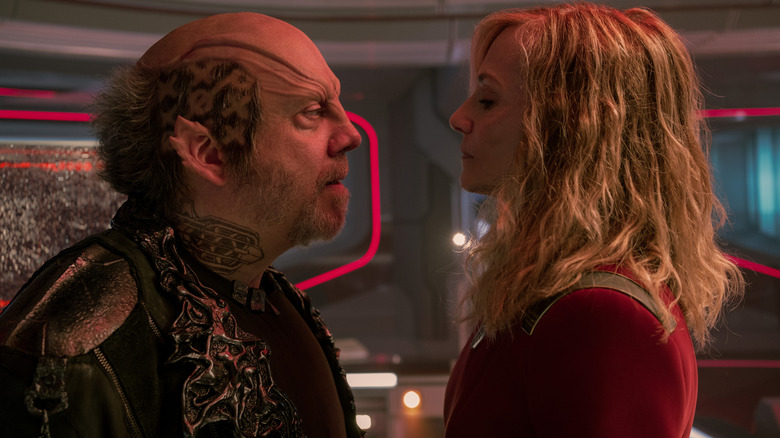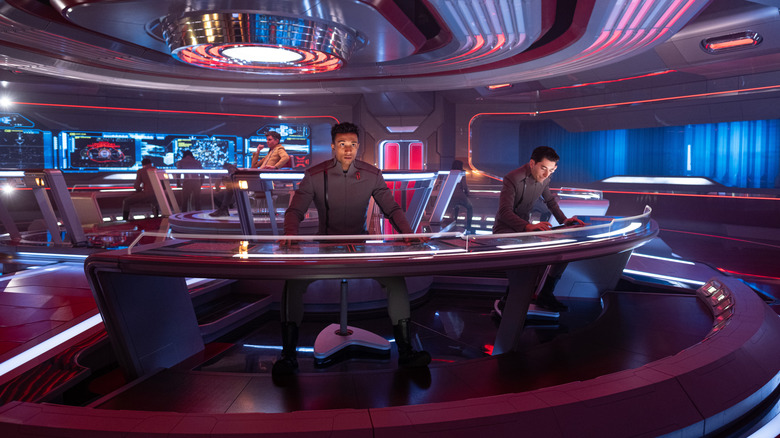Why Star Trek: Starfleet Academy Took So Long To Make It To Television
Rumors of a "Star Trek" show set in the United Federation's academy have floated around the internet for years, though it's only now that the series — which is officially titled "Starfleet Academy" — is finally becoming a reality. The first time we heard about the show was back in 2018, when current franchise figurehead Alex Kurtzman signed an overall deal to develop several "Star Trek" shows, including "Discovery." Our next update came three years later, after the Paramount+ streaming service arrived and provided a natural avenue for all things "Trek," particularly a younger-skewing series following Starfleet cadets. Now, the show is gearing up to premiere in early 2026 ... but, as it turns out, there was a very good reason for its long, winding path from start to finish.
In a new profile with Entertainment Weekly, Kurtzman and his fellow "Starfleet Academy" showrunner Noga Landau opened up about some of the biggest obstacles they faced in bringing this series across the finish line. The most challenging of these, apparently, had to do with the show's premise. By its very nature, a story told in an academy setting has to be stationary. You can't exactly pull a Captain Kirk and fly to the nearest planet, phasers blazing, if you're stuck in a school with fresh-faced kids learning the ropes. According to Landau:
"It's hard to come up with a circumstance and a buy-in where you can still have 'Star Trek' adventures with real stakes and real peril, but it's also a school. It's really important that viewers know that these kids actually go on real 'Star Trek' missions, and there is real 'Star Trek' peril and complex situations that they have to navigate."
Luckily, the show's creative team found a clever workaround to this: turn the school into a starship.
Starfleet Academy will take the school into the stars in season 1 ... and beyond
We've seen several "Star Trek" shows set on starships before, and we've seen others take place largely in one location (such as "Deep Space Nine"), but we've never seen one attempt to enjoy the best of both worlds the way that "Starfleet Academy" does. One of the bigger reveals out of this year's "Star Trek" New York Comic Con panel, the idea of a mobile Academy building instantly sets this series apart from all the rest. Far from just a mere gimmick, however, this turns out to be the most thrilling way to take the first class of cadets in well over 100 years (if you remember, the futuristic events of "Discovery" establish that Starfleet has largely become a shell of itself) and essentially have them learn on the job. Co-showrunner Alex Kurtzman described this to EW as:
"We really did liken it to a teaching hospital. You can only learn by getting thrown into the fire."
The series feels like a mashup of several different eras of "Trek" — you have the "Discovery" timeline, a noteworthy connection to "Deep Space Nine" and Benjamin Sisko, and even remnants of "Voyager" via the return of Robert Picardo's holographic Doctor. Through it all, we'll become invested in the adventures of a young group of cadets (led by Sandro Rosta as Caleb Mir), their Chancellor/Captain Nahla Ake (Holly Hunter), and the dastardly half-Klingon, half-Tellarite villain Nus Braka played by Paul Giamatti. But one nugget buried in the EW article is that the series, which is already in the middle of filming for season 2, could earn itself a third season if viewers prove to be enthused.
"Starfleet Academy" warps onto Paramount+ January 15, 2026.

